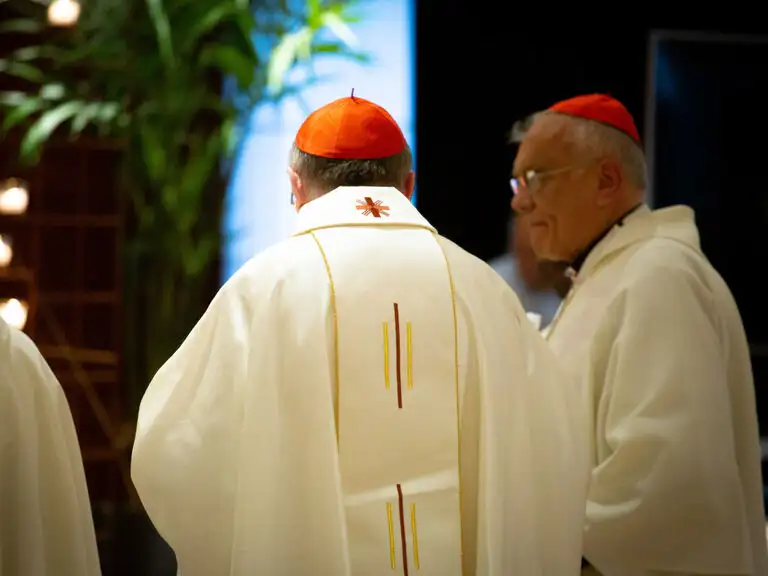Prayer for the conclave
A prayer that the cardinals in the conclave may be open to the Spirit and filled with wisdom and courage.

A conclave is a gathering of Cardinal electors who meet within the Vatican's Sistine Chapel in order to elect the new pope.
The word "conclave" itself comes from the Latin cum clave - meaning "with a key" - because the doors of the chapel are locked until a decision is made. During this time the Cardinal electors are cut off from the outside world - they are not allowed to send or receive messages of any kind or follow the news in any form.
The conclave will begin on Wednesday 7 May and will last until one of the Cardinals participating receives a two-thirds majority of the votes.
The length of a conclave varies. The longest lasted over two years back in the thirteenth century, but Pope Francis was elected the day after the conclave began.
Any baptised Catholic man can be elected. However, since 1378 all popes have been cardinals.
Only Cardinals under the age of 80 are eligible to vote in a conclave.
Since Pope Pius XII in the 1940s and 1950s, popes have sought to broaden the geographical distribution of cardinals. Pope Francis continued the trend and also prioritised appointing cardinals from countries with small Roman Catholic populations. He appointed 108 of the current 135 Cardinal electors and 56 minister in places which have never had a cardinal before.
The Cardinal electors come from 71 different countries, each bringing with them their own experiences and concerns, successes and hopes. Among the issues on the hearts and minds of the Cardinals are the burdens of unjust debt in Sri Lanka or Kenya, the plundering of minerals in the Amazon rainforest or the Congo basin, or religious persecution and conflict in Asia and the Middle East. Many will have had experience mediating dialogue and peace agreements, participating in synods on the youth and the Church in the Amazon or overseeing humanitarian aid. All this richness of experience will be taken into account as the Holy Spirit works through the Cardinals and the next leader of the Church is chosen.
In the lead up to the conclave, the Cardinals will have been discussing and getting to know each other at the General Congregations and other smaller gatherings.
During the conclave there are four voting sessions per day by secret ballot. Cardinal electors write the name of the man they think should be pope on a piece of paper and fold it twice. They then make a spoken vow before the altar, place their ballot on a plate, before dropping it into the box. The votes are counted by three scrutineers, who each mark the ballot, with the third scrutineer reading it aloud. The ballots are threaded together with a needle and string as they are counted, and the revisers check the votes before returning them to the scrutineers.
After each count the ballots are burned. If no one has received the two-thirds majority required, the smoke will burn black. Only when a pope has been elected is a chemical added to the process to create the white smoke from the chimney of the Sistine Chapel. If no one reaches a two-thirds majority of votes after seven sessions of voting, there is day's pause for prayer and discussion among the cardinals.
When a candidate is elected, the Dean of the College of Cardinals will ask, "Do you accept your canonical election as Supreme Pontiff?" Once he has accepted, he will then be asked, "By what name do you wish to be called?" At this point the new pope will choose his papal name before giving the Urbi et Orbi (to the city and the world) blessing from the balcomy of St Peter's Basilica.
The world is facing a challenging international combination of spiralling global debt, accelerating climate change and escalating humanitarian need.
A global debt crisis sees international lenders profit from poverty while dozens of countries spend more on debt payments than on health or education.
Multilateral action on climate change is increasingly urgent as floods and droughts devastate the world's more vulnerable communities.
Meanwhile millions go hungry in Gaza and Sudan and entire communities are near starvation due to conflict.
The Pope has a role in highlighting the challenges facing our world as CAFOD Director Christine Allen explains:
"Pope Francis' great gift was speaking truth to power in such a way that they listened, highlighting the plight of the vulnerable and pointing the way to peace, and his successor will likewise possess a powerful voice with the capacity to make world leaders sit up and take notice.
The new pontiff will be one of only a few people in the world who can cross political divides and use his moral influence to help all of us look beyond our narrow self-interests and work together to overcome our collective challenges.
Our prayers are with the Cardinals in the Sistine Chapel, as they seek to divine the will of God."
A prayer that the cardinals in the conclave may be open to the Spirit and filled with wisdom and courage.
Add your name to Pope Francis' call for world leaders to take action on the global debt crisis.
Your donations will help reach vulnerable people fleeing war, poverty and natural disasters.